English - Class 5


Topic outline
Direct and Indirect Speech
We can report the words of a speaker in two ways:
1. By repeating the exact words used by the speaker.
2. By reporting only the material of what he said.
Now read the following sentences.
1. Ram said , “ Anand is a good boy .”
2. Ram said that Anand was a good boy.
In the first sentence , we repeat, or quote, the exact words spoken by the speaker. This is called Direct Speech or Narration . Here we put the exact words of the speaker within quotation marks (" ") and we place a colon after 'said'. We write first word inside the quotation marks with a capital letter.
A comma is placed after the Reporting Verb to separate it from the second part of the sentence. In the first sentence, “ said ” is called the reporting verb, and “ Anand is a good boy .” is called the Reported Speech.
In the second sentence , we do not give the exact words of the speaker but give only the substance of what he said. This is called Indirect Speech or Narration .
In Indirect speech (sometimes called reported speech ), we do not use quotation marks to enclose what the person said and it doesn't have to be word for word. Here colon is not used after said. Reported or indirect speech is usually used to talk about the past, so we normally change the tense of the words spoken. The Verb ‘is’ is changed to was. (The Tense of the Verb in the Reported Speech is changed from the Present to the Past.). Here the Reported Speech is introduced by the Conjunction ‘that’.
Rules For Changing Direct Speech Into Indirect Speech
Rule 1: If the Reporting Verb is in the Present or Future Tense, the Verb in the Reported Speech is not changed at all. In other words, if in direct speech we find say, says or will say then we will not change the tense of the verb inside the quotation marks.
Here are some examples:
Direct Speech - Dia says, “There is no water in the glass.”
Indirect Speech - Dia says that there is no water in the glass.
Direct Speech - Ram will say, “Nobody was in the auditorium.”
Indirect Speech - Ram will say that nobody was in the auditorium.
Direct Speech - The tutor will say, “Hari will pass the entrance exam.”
Indirect Speech - The tutor will say that Hari will pass the entrance exam.
Direct Speech - She says, “Meena likes chicken curry.”
Indirect Speech - She says that Meena likes chicken curry.
Rule 2: If the Reporting Verb is in the Past Tense, the Verb in the Reported Speech is also changed to the Past Tense. In other word, if in direct speech we find reporting verb “said” then we will change the tense of the verb inside the quotation marks to the past tense.
1. The Simple Present becomes the Simple Past.
Direct Speech - Tia said, “Neena works very hard.”
Indirect Speech - Tia said that Neena worked very hard.
Direct Speech - She said, "It is cold outside."
Indirect Speech - She said it was cold outside.
2. The Present Continuous becomes the Past Continuous.
Direct Speech - He said, "I visited Delhi last year”
Indirect Speech - He said that he had visited Delhi the previous year.
Direct Speech - Meera said, "I'm teaching French online."
Indirect Speech - Meera said she was teaching French online.
3. The Present Perfect becomes the Past Perfect.
Direct Speech - Anu said, "I have lived here for a long time.”
Indirect Speech - Anu said that she had lived there for a long time.
Direct Speech - Meena said, “Kapil has written the article.”
Indirect Speech - Meena said that Kapil had written the article.
4. May is changed into might; can is changed into could.
Direct Speech - He said, “Rahul may clear the exam.”
Indirect Speech - He said that Rahul might clear the exam.
Direct Speech - I said, “I can solve this problem.”
Indirect Speech - I said that I could solve this problem.
5. The Simple Past becomes the Past Perfect.
Direct Speech - Dev,”Avi reached at night.”
Indirect Speech - Dev said that Avi had reached at night.
Direct Speech - He said, “She came at 11 a.m. in the morning.”
Indirect Speech - He said that she had come at 11 a.m. in the morning.
6. The Past Continuous becomes the Past Perfect Continuous.
Direct Speech - Ravi said, “All were looking at the magician.”
Indirect Speech - Ravi said that all had been looking at the magician.
Direct Speech - Jimmy said, “All the boys were shouting.”
Indirect Speech - Jimmy said that all the boys had been shouting.
7. Shall is changed into should; will is changed into would.
Direct Speech - Radha said, "I will open the door."
Indirect Speech - Radha said that she would open the door.
Direct Speech - I said, “I shall try to assist her.”
Indirect Speech - I said that I should try to assist her.
Rule 3: If in direct speech the Reported Speech contains some universal or habitual fact, then we will follow RULE ONE or in other words the tense inside the quotation marks remains unchanged.
Direct Speech - Ravi said, “Everything happens for a reason.”
Indirect Speech - Ravi said that everything happens for a reason.
Direct Speech - Teacher said, “The moon moves round the earth.”
Indirect Speech - Teacher said that the moon moves round the earth.
Direct Speech - She said, “God is never in hurry, but he is always on time.”
Indirect Speech - She said that God is never in hurry, but he is always on time.
Direct Speech - The teacher said,” The sun rises in the east”
Indirect Speech - The teacher said the sun rises in the east.
Rule 4: Pronouns of the First Person in Direct Speech are changed in indirect Speech to the same person as the subject of the introductory verb.
Direct Speech - Tia said, “I am tired.”
Indirect Speech - John said that I was tired.
Direct Speech - Sita said, “I have done my homework.”
Indirect Speech - Sita said that she had done her homework.
Direct Speech - He said, “I shall do my best.”
Indirect Speech - He said that he would do his best.
Direct Speech - He said, “I will not come.”
Indirect Speech - He said that he would not go there.
Direct Speech - I said, “The little boy calls me.”
Indirect Speech - I said that the little boy called me.
Rule 5: Pronouns of the Second Person in Direct Speech are changed in Indirect Speech to the same person as the noun or pronoun which comes after the introductory verb.
Direct Speech - Heera said to me, “You are genius.”
Indirect Speech - Heera told me that I was genius.
Direct Speech - Avi said to Abhi,”You are a smart boy.”
Indirect Speech - Avi told Abhi that he was a smart boy.
Direct Speech - Sia said to Kareena,”You are a nice girl.”
Indirect Speech - Sia told Kareena that she was a nice girl.
Direct Speech - Tom said to him, “You have not done your assignment.”
Indirect Speech - Tom told him that he had not done his assignment.
Direct Speech - Jimmy said to her, “You have done your job.”
Indirect Speech - Jimmy told her that she had done her job.
Rule 6: Pronouns of the Third Person in Direct Speech remain the same in Indirect Speech.
Direct Speech - Harmeet said to me, “She is not well.”
Indirect Speech - Harmeet told me that she was not well.
Direct Speech - He said to me, “She was correct.”
Indirect Speech - He told me that she was correct.
Direct Speech - Bali said to you, “You are mistaken.”
Indirect Speech - Bali told you that you are mistaken.
Note : - In all the above examples, the verb ‘said’ in Direct Speech becomes ‘told’ in Indirect Speech and the Preposition ‘to’ is omitted.
Rule 7: When turning a sentence from Direct into indirect Speech words showing ‘nearness’ are changed into words showing ‘distance.’ Thus:
Now becomes then.
Here becomes there.
Ago becomes before.
Today becomes before.
This becomes that.
These become those.
Tomorrow becomes the next day.
Yesterday becomes the day before (or the previous day).
Last night becomes the night before (or the previous night).
Direct Speech - Tim said, “I am free now.”
Indirect Speech - Tim said that he was free then.
Direct Speech - He said, “I have seen this woman in the market.”
Indirect Speech - He said that he had seen that woman in the market.
Direct Speech - I said, “These oranges are sour.”
Indirect Speech - I said that those oranges were sour.
Direct Speech - Heena said, “The red basket is here.”
Indirect Speech - Heena said that the red basket was there.
Direct Speech - She said,”Aftab may go tomorrow.”
Indirect Speech - She said that Aftab might go the next day.
Direct Speech - Teacher said, “Today is a sunny day.”
Indirect Speech - Teacher said that day was a sunny day.
Direct Speech - Ram said, “I went to the mall last night.”
Indirect Speech - Ram said that he had gone to the mall the night before.
Direct Speech - She said, “I went to cinema yesterday.”
Indirect Speech - She said that she had gone to the cinema the day before.
Rule 8: Commands and Requests
In reporting a Command or a Request in the Indirect Speech, we change the introductory Verb to request, order, command, advice or some other word suiting the sense. Here the verb in Reported Speech is put in the Infinitive.
Direct Speech - I said to Karishma,”Please give me your pen.”
Indirect Speech - I requested Karishma to give me her pen.
Direct Speech - “You must read this article” said the teacher to Riya.
Indirect Speech - Teacher advised Riya to read that article.
Direct Speech - He said to the Principal, “Forgive me.”
Indirect Speech - He begged the Principal to forgive him.
Direct Speech - The teacher said, “Do your best, Radhika.”
Indirect Speech - The teacher advised Radhika to do her best.
Direct Speech - He said, “Listen to me carefully.”
Indirect Speech- He urged them to listen to him carefully.
Rule 9: In reporting question in the Indirect Speech, we change introductory Verb to ask or inquire. We use ‘whether’ or ‘if’ if the interrogative sentence begins with a verb. Here interrogative form is changed into the Declarative form. There is no need to use new connective is used if the interrogative sentence begins with who, whose, whom, which, what, how, when or why.
Direct Speech - He said to me, “Where are you staying in Delhi?”
Indirect Speech - He asked me where I was staying in Delhi.
Direct Speech - Rosy said to her,” How are you doing?”
Indirect Speech - Rosy asked her how she was doing.
Direct Speech - The teacher said to the boy, “Why are you crying?”
Indirect Speech - The teacher asked the boy why he was crying.
Direct Speech - She said to me, “Have you completed your project?”
Indirect Speech - She asked me if I had completed my project.
Direct Speech - Mahesh said to me, “Do you play badminton?”
Indirect Speech - Mahesh asked me whether I played badminton.
Rule 10: Exclamations and Wishes
In reporting an Exclamation or Wish in the Indirect Speech, we omit words showing exclamation such as alas, hurrah, etc. and sign of exclamation. We change the introductory Verb into wish, claim, pray, bless, curse, etc.
Direct Speech - Students said, “Hurrah! We have won the series.”
Indirect Speech - Students exclaimed with joy that they had won the series.
Direct Speech - She said to her, “May you live long!”
Indirect Speech - She wished that she might live long.
Direct Speech - Harish said to her, “My God bless you!”
Indirect Speech - Harish prayed that god might bless her.
Download to practice offline.
- Kindergarten
- Greater Than Less Than
- Measurement
- Multiplication
- Place Value
- Subtraction
- Punctuation
- 1st Grade Reading
- 2nd Grade Reading
- 3rd Grade Reading
- Cursive Writing
- Alphabet Coloring
- Animals Coloring
- Birthday Coloring
- Boys Coloring
- Buildings Coloring
- Cartoons Coloring
- Christmas Coloring
- Country Flag Coloring
- Country Map Coloring
- Disney Coloring
- Fantasy Coloring
- Food Coloring
- Girls Coloring
- Holidays Coloring
- Music Coloring
- Nature Coloring
- New Year Coloring
- People Coloring
- Religious Coloring
- Sports Coloring
- Toys Coloring
- Transportation Coloring
- US Sports Team Coloring
- Valentine Day Coloring
Reported Speech For Grade 5 With Answer
Displaying top 8 worksheets found for - Reported Speech For Grade 5 With Answer .
Some of the worksheets for this concept are Reported statements mixed exercise, Direct indirect speech, Direct and indirect speech, Reported speech work, Reported speech rs 1, Reported speech ejercicios, Grammar challenge, Reported speech.
Found worksheet you are looking for? To download/print, click on pop-out icon or print icon to worksheet to print or download. Worksheet will open in a new window. You can & download or print using the browser document reader options.
1. Reported Statements Mixed Exercise
2. direct . indirect speech, 3. direct and indirect speech, 4. reported speech worksheet, 5. reported speech rs 1 -, 6. reported speech ejercicios -, 7. grammar challenge, 8. reported speech.
- English Grammar
- Reported Speech
Reported Speech - Definition, Rules and Usage with Examples
Reported speech or indirect speech is the form of speech used to convey what was said by someone at some point of time. This article will help you with all that you need to know about reported speech, its meaning, definition, how and when to use them along with examples. Furthermore, try out the practice questions given to check how far you have understood the topic.

Table of Contents
Definition of reported speech, rules to be followed when using reported speech, table 1 – change of pronouns, table 2 – change of adverbs of place and adverbs of time, table 3 – change of tense, table 4 – change of modal verbs, tips to practise reported speech, examples of reported speech, check your understanding of reported speech, frequently asked questions on reported speech in english, what is reported speech.
Reported speech is the form in which one can convey a message said by oneself or someone else, mostly in the past. It can also be said to be the third person view of what someone has said. In this form of speech, you need not use quotation marks as you are not quoting the exact words spoken by the speaker, but just conveying the message.
Now, take a look at the following dictionary definitions for a clearer idea of what it is.
Reported speech, according to the Oxford Learner’s Dictionary, is defined as “a report of what somebody has said that does not use their exact words.” The Collins Dictionary defines reported speech as “speech which tells you what someone said, but does not use the person’s actual words.” According to the Cambridge Dictionary, reported speech is defined as “the act of reporting something that was said, but not using exactly the same words.” The Macmillan Dictionary defines reported speech as “the words that you use to report what someone else has said.”
Reported speech is a little different from direct speech . As it has been discussed already, reported speech is used to tell what someone said and does not use the exact words of the speaker. Take a look at the following rules so that you can make use of reported speech effectively.
- The first thing you have to keep in mind is that you need not use any quotation marks as you are not using the exact words of the speaker.
- You can use the following formula to construct a sentence in the reported speech.
- You can use verbs like said, asked, requested, ordered, complained, exclaimed, screamed, told, etc. If you are just reporting a declarative sentence , you can use verbs like told, said, etc. followed by ‘that’ and end the sentence with a full stop . When you are reporting interrogative sentences, you can use the verbs – enquired, inquired, asked, etc. and remove the question mark . In case you are reporting imperative sentences , you can use verbs like requested, commanded, pleaded, ordered, etc. If you are reporting exclamatory sentences , you can use the verb exclaimed and remove the exclamation mark . Remember that the structure of the sentences also changes accordingly.
- Furthermore, keep in mind that the sentence structure , tense , pronouns , modal verbs , some specific adverbs of place and adverbs of time change when a sentence is transformed into indirect/reported speech.
Transforming Direct Speech into Reported Speech
As discussed earlier, when transforming a sentence from direct speech into reported speech, you will have to change the pronouns, tense and adverbs of time and place used by the speaker. Let us look at the following tables to see how they work.
Here are some tips you can follow to become a pro in using reported speech.
- Select a play, a drama or a short story with dialogues and try transforming the sentences in direct speech into reported speech.
- Write about an incident or speak about a day in your life using reported speech.
- Develop a story by following prompts or on your own using reported speech.
Given below are a few examples to show you how reported speech can be written. Check them out.
- Santana said that she would be auditioning for the lead role in Funny Girl.
- Blaine requested us to help him with the algebraic equations.
- Karishma asked me if I knew where her car keys were.
- The judges announced that the Warblers were the winners of the annual acapella competition.
- Binsha assured that she would reach Bangalore by 8 p.m.
- Kumar said that he had gone to the doctor the previous day.
- Lakshmi asked Teena if she would accompany her to the railway station.
- Jibin told me that he would help me out after lunch.
- The police ordered everyone to leave from the bus stop immediately.
- Rahul said that he was drawing a caricature.
Transform the following sentences into reported speech by making the necessary changes.
1. Rachel said, “I have an interview tomorrow.”
2. Mahesh said, “What is he doing?”
3. Sherly said, “My daughter is playing the lead role in the skit.”
4. Dinesh said, “It is a wonderful movie!”
5. Suresh said, “My son is getting married next month.”
6. Preetha said, “Can you please help me with the invitations?”
7. Anna said, “I look forward to meeting you.”
8. The teacher said, “Make sure you complete the homework before tomorrow.”
9. Sylvester said, “I am not going to cry anymore.”
10. Jade said, “My sister is moving to Los Angeles.”
Now, find out if you have answered all of them correctly.
1. Rachel said that she had an interview the next day.
2. Mahesh asked what he was doing.
3. Sherly said that her daughter was playing the lead role in the skit.
4. Dinesh exclaimed that it was a wonderful movie.
5. Suresh said that his son was getting married the following month.
6. Preetha asked if I could help her with the invitations.
7. Anna said that she looked forward to meeting me.
8. The teacher told us to make sure we completed the homework before the next day.
9. Sylvester said that he was not going to cry anymore.
10. Jade said that his sister was moving to Los Angeles.
What is reported speech?
What is the definition of reported speech.
Reported speech, according to the Oxford Learner’s Dictionary, is defined as “a report of what somebody has said that does not use their exact words.” The Collins Dictionary defines reported speech as “speech which tells you what someone said, but does not use the person’s actual words.” According to the Cambridge Dictionary, reported speech is defined as “the act of reporting something that was said, but not using exactly the same words.” The Macmillan Dictionary defines reported speech as “the words that you use to report what someone else has said.”
What is the formula of reported speech?
You can use the following formula to construct a sentence in the reported speech. Subject said that (report whatever the speaker said)
Give some examples of reported speech.
Given below are a few examples to show you how reported speech can be written.
Leave a Comment Cancel reply
Your Mobile number and Email id will not be published. Required fields are marked *
Request OTP on Voice Call
Post My Comment
Register with BYJU'S & Download Free PDFs
Register with byju's & watch live videos.
Class 5 English Grammar Chapter 7 Reported Speech
NCERT Solutions for Class 5 English Grammar Chapter 7 Reported Speech (Direct and Indirect Speech) updated for session 2024-25. State boards and CBSE students can take the benefits of these contents clearing their doubts. Lots of illustrations are given for practice the concepts.
Class 5 English Grammar Chapter 7 Reported Speech (Direct and Indirect)
- Class 5 English Grammar Chapter 7 Direct and Indirect Speech
- Class 5 English Grammar Chapter 7 Revision Book
- Class 5 English Grammar Main Page
- Class 5 all Subjects NCERT Solutions
The following paragraphs illustrate the two ways in which we can report the words of a speaker.
- 1. Teacher said, “Have you done your homework?” Student said, “Sorry, teacher, I could not complete it.” Teacher said, “Why couldn’t you complete your homework? Now get out of my class!”
- 2. The teacher asked the student if he had done his homework. The student apologised that he could not do his homework. On knowing this, the teacher angrily asked him the reason for not doing the homework and asked him to get out of the class.
In 1, we give the exact words used by the speaker. This is called the Direct Speech. In 2, we do not give the exact words of the speaker but give only the substance of what he said. This is called the Indirect Speech or Narration.
The following rules will help you in changing Direct Speech into Indirect: Rule 1: If the Reporting Verb is in the Present or Future Tense, the Verb in the Reported Speech is not changed at all. Direct: Meena says, “There is no water in the jug.” Indirect: Meena says that there is no water in the jug.
Rule 2: If the Reporting Verb is in the Past Tense, the Verb in the Reported Speech is also in the Past Tense. The matter inside the inverted comma will change as under. 1. The Simple Present becomes the Simple Past; as: Direct: Teacher said, “Kitty works very hard.” Indirect: Teacher said that Kitty worked very hard.
Rule 3: (Exception to Rule 2.) If the reported speech contains some universal or habitual fact, then the Simple Present in the Reported Speech is not changed into the corresponding Simple Past, but remains unchanged. Direct: The Mother Teresa said, “Charity begins at home.” Indirect: The Mother Teresa said that Charity begins at home.
Rule 4: Students may carefully note the following in order to understand the change of persons. First Person is changed into the person of the subject. Second Person is changed into the person of the object. For the Third Person, there is no change.
Rule 5: In the Reported Speech ‘said to’ changes to “told”, thus: Direct: He said to me, “I will go there tomorrow.” Indirect: He told me that he would go there the next day.
Rule 6: In the Reported Speech the words expressing nearness are changed into words expressing distance or remoteness, thus: ex.: This- changes into- that
What is reported speech and its type in Chapter 7 Class 5 English Grammar?
Reported speech is the way we can express our thoughts. There are two type of reported speeches: (i). Direct Speech (ii). Indirect speech
What is the main difference between direct and indirect speeches in Class 5 Grammar Chapter 7?
Direct speech: in the direct speech sentences we give the exact words used by the speaker. This is called the Direct Speech. Ex.: Meena says, “There is no water in the jug.” Indirect speech: in the indirect speech sentences we do not give the exact words of the speaker but give only the substance of what he said. This is called the Indirect Speech or Narration. Ex.: Meena says that there is no water in the jug.
What is the indirect form of Present Perfect in 5th Grammar Chapter 7?
The Present Perfect becomes the Past Perfect; when sentence changes from direct speech to indirect speech. Ex.: Direct: Srikant said. “Mini has done his work.” Indirect: Srikant said that Mini had done his work.
In what condition Simple Present in the Reported Speech is not changed into the corresponding Simple Past in Class 5 Grammar?
If the reported speech contains some universal or habitual fact, then the Simple Present in the Reported Speech is not changed into the corresponding Simple Past, but remains unchanged. Ex.: Direct: The Mother Teresa said, “Charity begins at home.” Indirect: The Mother Teresa said that Charity begins at home.
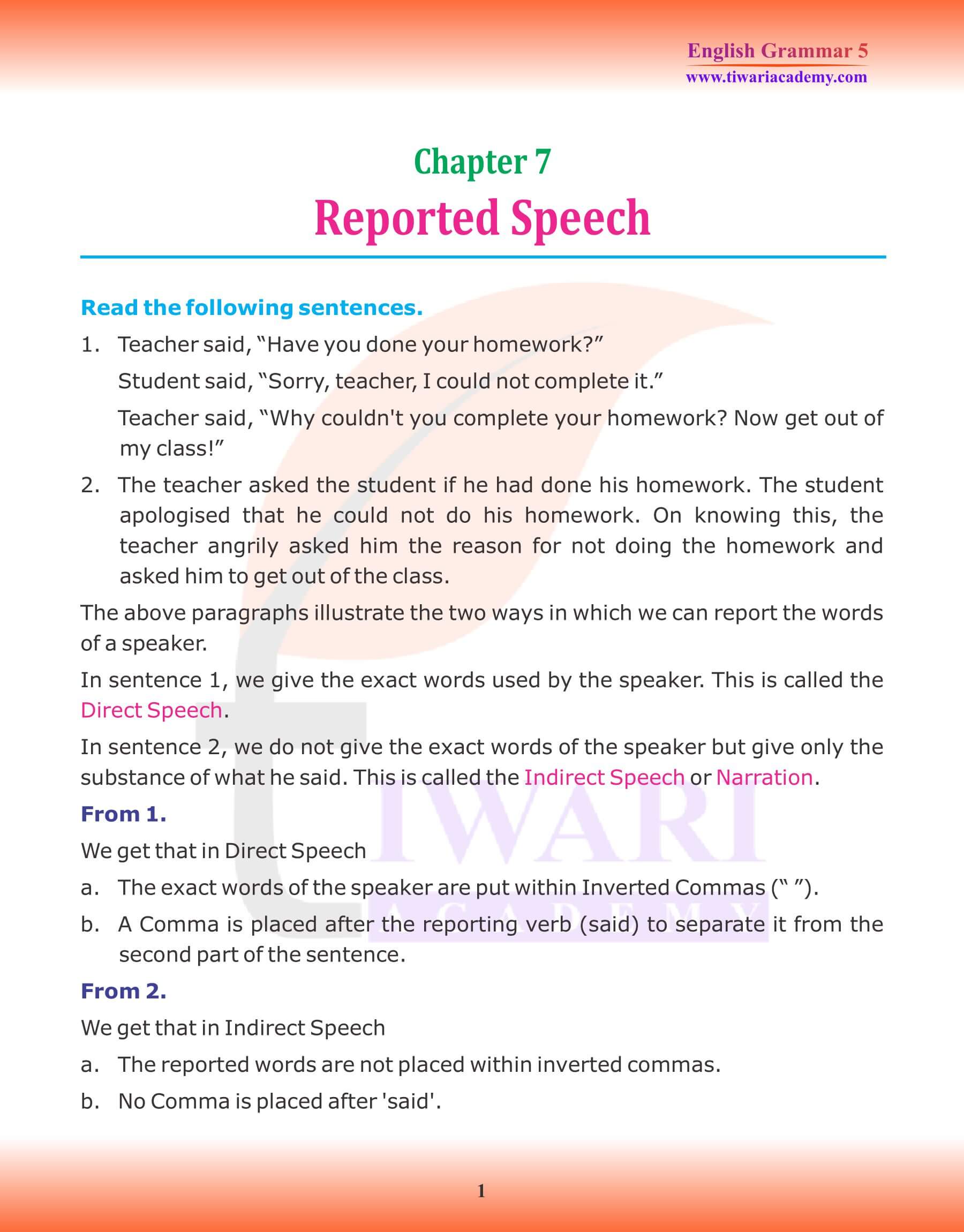
Copyright 2024 by Tiwari Academy | A step towards Free Education


Reported speech - 1
Reported speech - 2
Reported speech - 3
Worksheets - handouts
Reported speech
Worksheets - pdf exercises.
- Reported statements - worksheet
- Worksheet - reported questions
- Reported yes/no questions
- Worksheet - reported speech
- Reported speech - exercises pdf
- Indirect speech - exercises
- Reported speech - exercises
- Mixed reported speech 1
- Mixed reported speech 2
- Reported speech 1
- Reported speech 2
- Reported speech 3
- Reported speech 4
- Reported speech 5
- Reported wh- questions
- Reported speech - worksheet
- Reported commands
- Reported questions
- Reported speech 1
- Reported speech 2
- Reported requests and orders
- Reported speech exercise
- Reported questions - worksheet
- Indirect speech - worksheet
- Worksheets pdf - print
- Grammar worksheets - handouts
Grammar - lessons
- Reported speech - grammar notes
- How to use reported speech - lesson
- Tense changes - grammar
- Conjunctions
- Creative writing
- Letter writing & story writing
- Message writing & Essay writing
- Preposition
- Punctuation
- Reading comprehension
Reported speech
- Same meaning
- Spelling challenge
- Subject, predicate and object
- Subject-verb agreement
Enhance your Grade 5 students' understanding of Reported Speech with our engaging worksheets. These resources will help students learn how to accurately report what others have said. Perfect for reinforcing grammar skills and preparing students for more complex language concepts. Upgrade your curriculum with our Reported Speech worksheets today!
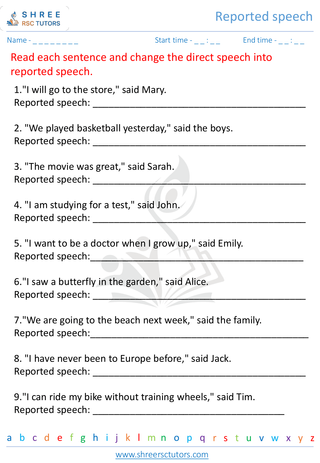
Reported Speech 1
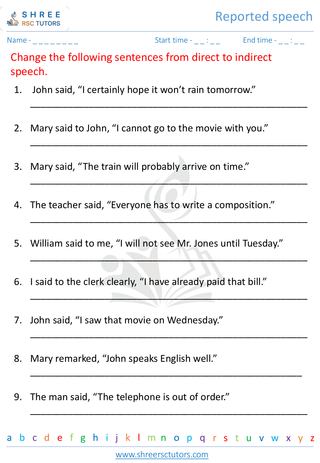
Reported Speech 2
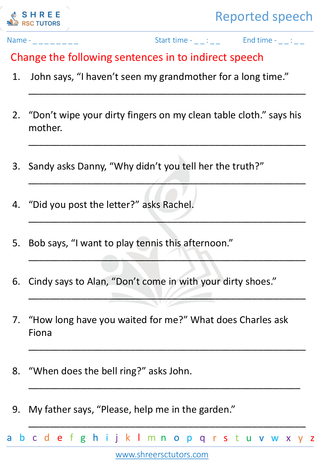
Reported Speech 3
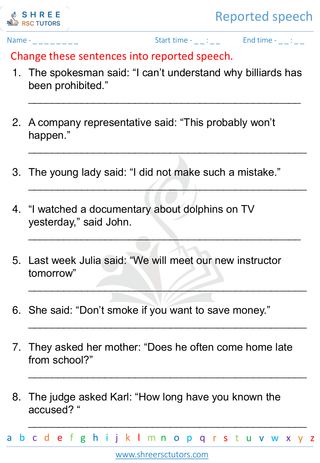
Reported Speech 4
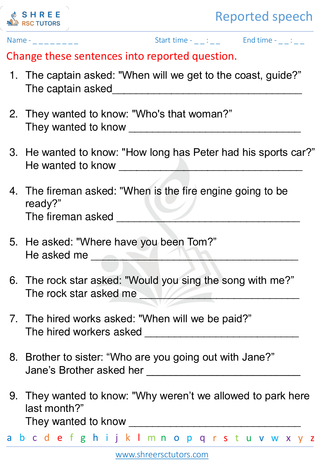
Reported Speech 5
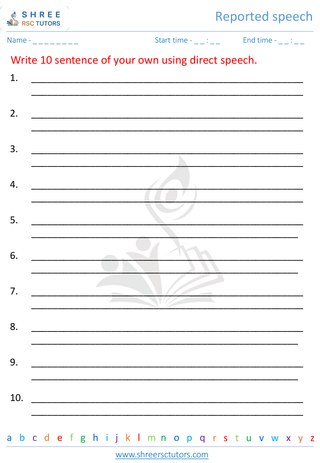
Reported Speech 6
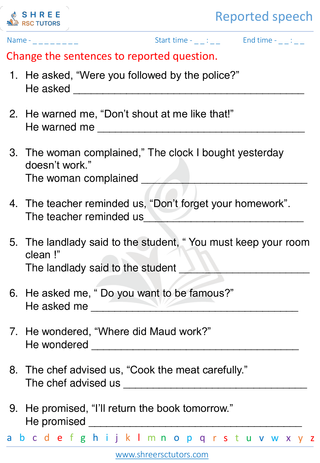
Reported Speech 7
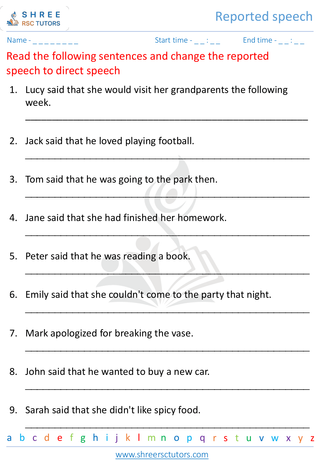
Reported Speech 8
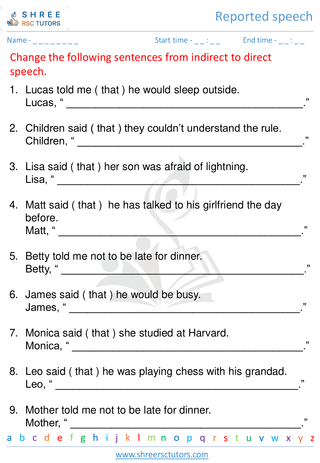
Reported Speech 9
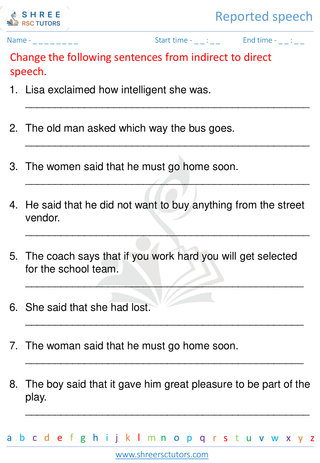
Reported Speech 10

QUICK LINKS
Pre Kindergarten English Worksheet
Kindergarten English Worksheet
Grade 1 English Worksheet
KS1 SATs English Worksheet
Grade 2 English Worksheet
Grade 3 English Worksheet
Grade 4 English Worksheet
Grade 5 English Worksheet
Grade 6 English Worksheet
Grade 7 English Worksheet
Grade 8 English Worksheet
Grade 9 English Worksheet
Grade 10 English Worksheet
Pre Kindergarten Maths Worksheet
Kindergarten Maths Worksheet
Grade 1 Maths Worksheet
Grade 2 Maths Worksheet
Grade 3 Maths Worksheet
Grade 4 Maths Worksheet
Grade 5 Maths Worksheet
Grade 6 Maths Worksheet
Grade 7 Maths Worksheet
Grade 8 Maths Worksheet
Grade 9 Maths Worksheet
Grade 10 Maths Worksheet
11 Plus Exam Maths Worksheet
Grade 11 Maths Worksheet
Grade 12 Maths Worksheet
GCSE Maths Worksheet
Write to Shree RSC tutors
+44 7442 074 163

The Reported Speech
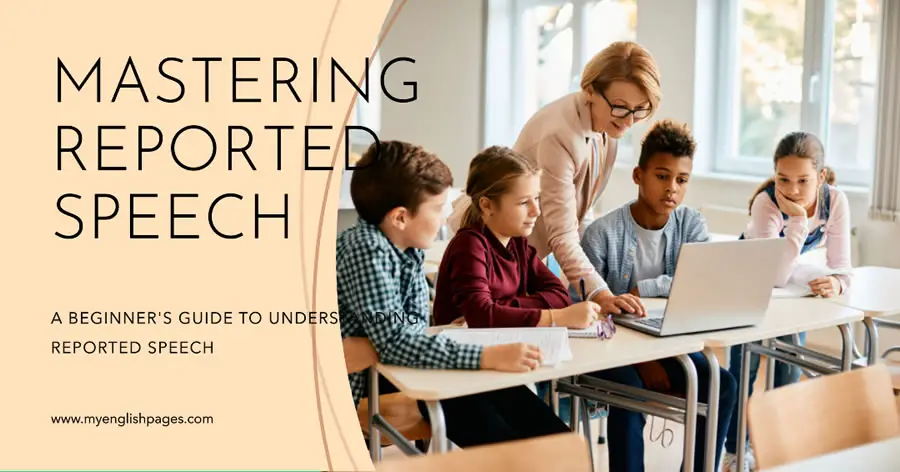
Table of Contents
What is reported speech.
Reported speech is when you tell somebody what you or another person said before. When reporting a speech, some changes are necessary.
For example, the statement:
- Jane said she was waiting for her mom .
is a reported speech, whereas:
- Jane said, “I’m waiting for my mom.”
is a direct speech.
Reported speech is also referred to as indirect speech or indirect discourse .
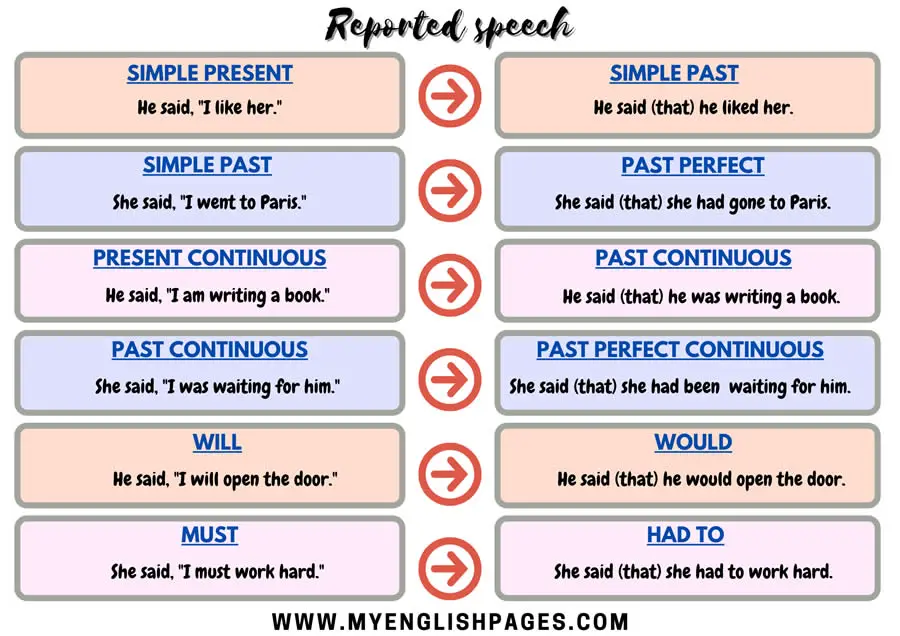
Before explaining how to report a discourse, let us first distinguish between direct speech and reported speech .
Direct speech vs reported speech
1. We use direct speech to quote a speaker’s exact words. We put their words within quotation marks. We add a reporting verb such as “he said” or “she asked” before or after the quote.
- He said, “I am happy.”
2. Reported speech is a way of reporting what someone said without using quotation marks. We do not necessarily report the speaker”‘s exact words. Some changes are necessary: the time expressions, the tense of the verbs, and the demonstratives.
- He said that he was happy.
More examples:
Different types of reported speech
When you use reported speech, you either report:
- Requests/commands
- Other types

A. Reporting statements
When transforming statements, check whether you have to change:
- place and time expression
1- Pronouns
In reported speech, you often have to change the pronoun depending on who says what.
She says, “My dad likes roast chicken.” => She says that her dad likes roast chicken.
- If the sentence starts in the present, there is no backshift of tenses in reported speech.
- If the sentence starts in the past, there is often a backshift of tenses in reported speech.
No backshift
Do not change the tense if the introductory clause (i.e., the reporting verb) is in the present tense (e. g. He says ). Note, however, that you might have to change the form of the present tense verb (3rd person singular).
- He says, “I write poems.” => He says that he writes English.
You must change the tense if the introductory clause (i.e., the reporting verb) is in the past tense (e. g. He said ).
- He said, “I am happy.”=> He said that he was happy.
Examples of the main changes in verb tense :
3. Modal verbs
The modal verbs could, should, would, might, needn’t, ought to, and used to do not normally change.
- He said: “She might be right.” => He said that she might be right.
- He told her: “You needn’t see a doctor.” => He told her that she needn’t see a doctor.
Other modal verbs such as can, shall, will, must, and ma y change:
4- Place, demonstratives, and time expressions
Place, demonstratives, and time expressions change if the context of the reported statement (i.e. the location and/or the period of time) is different from that of the direct speech.
In the following table, you will find the different changes of place; demonstratives, and time expressions.
B. Reporting Questions
When transforming questions, check whether you have to change:
- The pronouns
- The place and time expressions
- The tenses (backshift)
Also, note that you have to:
- transform the question into an indirect question
- use the question word ( where, when, what, how ) or if / whether
>> EXERCISE ON REPORTING QUESTIONS <<
C. Reporting requests/commands
When transforming requests and commands, check whether you have to change:
- place and time expressions
- She said, “Sit down.” – She asked me to sit down.
- She said, “don’t be lazy” – She asked me not to be lazy
D. Other transformations
- Expressions of advice with must , should, and ought are usually reported using advise / urge . Example: “You must read this book.” He advised/urged me to read that book.
- The expression let’s is usually reported using suggest . In this case, there are two possibilities for reported speech: gerund or statement with should . Example : “Let’s go to the cinema.” 1. He suggested going to the cinema. 2. He suggested that we should go to the cinema.
Main clauses connected with and/but
If two complete main clauses are connected with and or but , put that after the conjunction.
- He said, “I saw her but she didn’t see me.=> He said that he had seen her but that she hadn’t seen him.
If the subject is dropped in the second main clause (the conjunction is followed by a verb), do not use that .
- She said, “I am a nurse and work in a hospital.=> He said that she was a nurse and worked in a hospital.
punctuation rules of the reported speech
Direct speech:
We normally add a comma between the reporting verbs (e.g., she/he said, reported, he replied, etc.) and the reported clause in direct speech. The original speaker”s words are put between inverted commas, either single (“…”) or double (“…”).
- She said, “I wasn’t ready for the competition”.
Note that we insert the comma within the inverted commas if the reported clause comes first:
- “I wasn’t ready for the competition,” she said.
Indirect speech:
In indirect speech, we don’t put a comma between the reporting verb and the reported clause and we omit the inverted quotes.
- She said that she hadn’t been ready for the competition.
In reported questions and exclamations, we remove the question mark and the exclamation mark.
- She asked him why he looked sad?
- She asked him why he looked sad.
Can we omit that in the reported speech?
Yes, we can omit that after reporting verbs such as he said , he replied , she suggested , etc.
- He said that he could do it. – He said he could do it.
- She replied that she was fed up with his misbehavior. – She replied she was fed up with his misbehavior.
List of reporting verbs
Reported speech requires a reporting verb such as “he said”, she “replied”, etc.
Here is a list of some common reporting verbs:
- Cry (meaning shout)
- Demonstrate
- Hypothesize
- Posit the view that
- Question the view that
- Want to know
In reported speech, we put the words of a speaker in a subordinate clause introduced by a reporting verb such as – “ he said ” and “ she asked “- with the required person and tense adjustments.
Related pages
- Reported speech exercise (mixed)
- Reported speech exercise (questions)
- Reported speech exercise (requests and commands)
- Reported speech lesson
Talk to our experts
1800-120-456-456
English Grammar Reported Speech for Class 5
English Grammar
- Reported Speech

English Grammar Reported Speech For Class 5- Download Free PDF With Solutions
To speak and communicate in English, it is highly important to learn the language. Speaking can be done in many ways, like direct speech, indirect speech, active voice, or passive voice. Class 5 English Chapter 7 is about reported speech, which is a part of direct and indirect speech. To get a clear idea about reported speech, how the subject and verb change, changing tense and tone, etc., are explained in detail in the topic of direct and indirect speech PDF.
The reported speech is a term used in both direct speech and indirect speech. Here direct speech refers to the words given by the speaker as it is without changing any the first person, second person, or third person, the verbs, or anything else. At the same time, indirect speech is conveying the message of the speaker in our own words.
English Grammar for Class 5 Reported Speech Download Free PDF
Today we will study an exciting topic “Reported speech”. Reported speech refers to how we have interpreted the words of the speaker. In simple terms, Reported speech refers to reporting the speech of the speaker i.e. whether conveying directly the words of the speaker or indirectly conveying after altering the words of the speaker. For good understanding and idea clarity, practice questions and solved examples are provided throughout the article. Let's start our journey on this pretty topic.

Parts of Reported Speech in a Sentence
Speech Used Directly and Indirectly. There are two methods we can record a speaker's words:
1. By reiterating the speaker's precise words.
2. By retelling only the pertinent portions of his remarks.
Reported verb
Reported speech

The Convey of Speech
For Example
1. “Anand is a good boy,” Ram said.
2. Ram praised Anand for being a decent youngster.
We paraphrase or quote the speaker's precise words in the first sentence. Direct speech or narration is what this is. Here, we enclose the speaker's exact words in quotation marks (" ") and add a colon after the word "said." The first word is capitalised and placed within quotation marks.
The second portion of the sentence is separated from the reporting verb by a comma. The reporting verb "said" and the reported speech "Anand is a good boy." are both used in the first sentence.
Reporting Verb
The part of the sentence which is not in the inverted commas is called the reported verb.
When we change direct speech into indirect speech then there are 3 types/ forms of changes that take place.
Change of person
Change of tense and
Change of other parts of speech
Reporting Speech
The part of the sentence which is under inverted commas is called reporting speech.
The second part of the sentence refers to some other person, universal facts, imaginary parts, historical facts, happening events, etc.
For example, Shyam said, “TheTaj Mahal was built by Shahjahan.”
Here the sentence “Taj Mahal was built by Shahjahan” is the reported speech.
Basically, there are two types of speech.
Direct speech
Indirect speech

Conversation Between 2 Persons
Direct Speech
It refers to reporting the exact words spoken by the speaker. There is no change in the verb or the sentence.
For example, Ram said to Riya, “go to school”
Priya asked Ram, “where is her bag”
Ratan enquired Raman,” why was he not picking up her call”.
Rules of Direct Speech
Quotes or inverted commas should be used to begin a speech.
The term said is used to join two sentences together.
At the end of the sentence, utilise the reporting clause.
A full stop should be placed at the end of the sentence.
It is the speech that communicates what someone has said but does not explain what the person has stated. It only provides the core narrative of what is spoken.
Indirect Speech
This refers to reporting the words spoken by the speaker in the third person. There will be a few changes in the verb or the sentence.
For example,
Direct: He says, “I will be on leave from the 12th.”
Indirect: He says that he will be on leave from the 12th.
Direct: Sheena said, “My parents are doing much better.”
Indirect: Sheena informed her parents are doing much better now.
Rules of Indirect Speech
The past tense is used when the situation is uncertain.
The present tense of a statement is transformed into the past tense through indirect speaking.
The tense of universal facts remains constant.
The term "that" connects the reported verb and sentence.
Difference Between Direct Speech and Indirect Speech
Word meaning, practice question.
Rewrite the following sentence converting from direct speech to indirect speech.
He said, “I live in the city centre”.
He said, “I am going out”.
He said, “I have finished”.
He said, “I have been studying a lot”.
He said, “I arrived before you”.
He said he lived in the city centre.
He said he was going out.
He said he had finished.
He said he had been studying a lot.
He said he had arrived before me.
Importance of Reported Speech in English Grammar for Class 5
Introducing direct and indirect speech for Class 5 is very beneficial and crucial in developing language skills among the students. Besides speaking ability, students can understand the various changes while reading the lessons; they can easily identify the speaker's tone and how he is conveying the message to others. It also benefits them in developing writing skills like writing essays, autobiographies, etc.
Practicing direct and indirect speech exercises in Class 5 also helps to understand the tenses and how the verb changes from one speech to another speech.
To get fluency in all language skills, reported speech is very useful. Even though it is quite confusing, once you get a command on the topic, it is easy to solve any question asked from it.
Direct and indirect speech for Class 5 is only at a basic level. Students can understand easily and can convert them as this foundation will be strong, and the advanced levels will become easier in the upcoming classes.
Examples of Reported Speech for Class 5
Let's have a glance at a few examples of both direct speech and indirect speech.
The teacher said to Shelly, “Why are you laughing?”
Dhronacharya said to Arjun, “Shoot the fish’s eye.”
My mother said to me, “You were wrong.”
Mr. Richard said to me, “Please wait here till I return.”
The captain said to me, “Bravo! You have played well.”
“Call the first convict,” said the jury.
“Call the ambulance,” said the man.
Bruce said to me, “I shall do the work.”
Examples for indirect speech:-
Dhronacharya ordered Arjun to shoot the fish’s eye.
The jury was ordered to call the first convict.
The captain applauded me, saying that I had played well.
The man urged to call the ambulance.
Bruce said to me he would do the work.
My mother told me that I was wrong.
Mr. Richard requested me to wait there till he returned.
Download Direct And Indirect Speech Worksheets With Answers Class 5 PDF
As the topic of reported speech requires practice, downloading a free PDF of Class 5 English Chapter 7 can be of great help for the students. The reported speech for Class 5 will be divided into two topics like direct speech and indirect speech.
Direct and indirect speech for Class 5 PDF contains proper definitions, examples, and conversion rules for direct speech, and indirect speech. These are provided in separate practicing worksheets with the solutions.
Our subject experts prepared the content and exercises in a simple language. Also, providing direct and indirect speech worksheets at various levels helps to access the children and develop themselves slowly level by level.
Students can practice whenever and wherever they want with these free PDF. Also, they can clarify their doubts through live chats with the subject experts.
Vedantu makes it easier to understand direct and indirect speech in a simplified manner. So that children can enjoy learning and be excited to work on the worksheets.
The only distinction between direct and indirect speech is in transmitting actual words and pirated words, with authentic words expressed in direct speech and pirated words presented in indirect speech. A sentence with inverted commas is considered direct speech, whereas a sentence with a conjunction is considered indirect communication.
FAQs on English Grammar Reported Speech for Class 5
1. What is direct speech?
Direct speech is a speech where the message of the speaker will be conveyed directly by keeping quotation marks for the speaker's words without changing anything.
2. What is indirect speech?
Indirect speech is a speech where the message of the speaker will be conveyed by the narrators in words without keeping any quotation marks etc.
3. What is the major benefit of direct and indirect speech?
Direct and direct speech is widely used to portray the exact moods and tenses of the characters. It creates a feeling like the situation is happening right now. It completely improves the narrating skills.


IMAGES
VIDEO
COMMENTS
Change them into the indirect speech, English Grammar Grade 5, English Grammar for class V. Select activity Direct and Indirect Speech - Questions Direct and Indirect Speech - Questions Page. Direct and Indirect Speech. We can report the words of a speaker in two ways: ...
Displaying top 8 worksheets found for - Reported Speech For Grade 5 With Answer. Some of the worksheets for this concept are Reported statements mixed exercise, Direct indirect speech, Direct and indirect speech, Reported speech work, Reported speech rs 1, Reported speech ejercicios, Grammar challenge, Reported speech.
Reported Speech: In this article, you will be introduced to reported speech, its meaning and definition, how and when to use it. You can also check out the examples given for a much better understanding of reported speech. Login. Study Materials. NCERT Solutions. NCERT Solutions For Class 12.
NCERT Solutions for Class 5 English Grammar Chapter 7 Reported Speech (Direct and Indirect Speech) updated for session 2024-25. State boards and CBSE students can take the benefits of these contents clearing their doubts. Lots of illustrations are given for practice the concepts.
Reported speech : worksheets pdf, printable exercises, handouts. Direct and indirect speech for esl.
Speech: Direct And Indirect | English Grammar & Composition Grade 5 | PeriwinkleWatch our other videos:English Stories for Kids: https://www.youtube.com/play...
Reported speech Enhance your Grade 5 students' understanding of Reported Speech with our engaging worksheets. These resources will help students learn how to accurately report what others have said. Perfect for reinforcing grammar skills and preparing students for more complex language concepts. Upgrade your curriculum with our Reported Speech ...
Before explaining how to report a discourse, let us first distinguish between direct speech and reported speech. Direct speech vs reported speech. 1. We use direct speech to quote a speaker's exact words. We put their words within quotation marks. We add a reporting verb such as "he said" or "she asked" before or after the quote. Example:
Importance of Reported Speech in English Grammar for Class 5. Introducing direct and indirect speech for Class 5 is very beneficial and crucial in developing language skills among the students. Besides speaking ability, students can understand the various changes while reading the lessons; they can easily identify the speaker's tone and how he ...
5 Lesson 9. Reported Speech Reporting Statements -Tenses 2. Tenses If the sentence starts in the present, there is no backshift of tenses in reported speech. If the sentence starts in the past, there is often backshift of tenses in reported speech. Backshift You must change the tense if the introductory clause is in a past tense (e. g. He said).